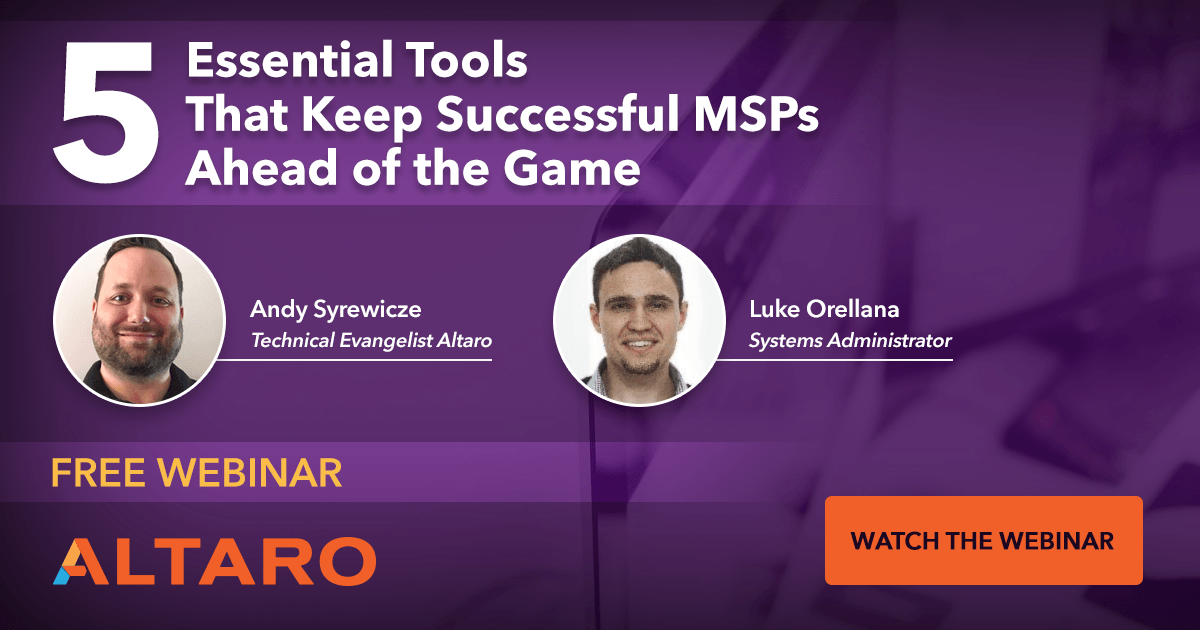Save to My DOJO
If you keep tabs on our blog, you likely know that Luke Orellana and I recently put on a webinar regarding MSP Toolsets. We define an MSP toolset as the collection of applications that you, as an MSP, use to run your business. This includes things like RMM platforms, Professional Services Automation software, hosting platforms and more. In the webinar, Luke and I talked about some of the most important tools that you can bring into your MSP and why they’re important. If you’d like to revisit that webinar or watch it for the first time (if you couldn’t join us for the webinar), you can do so here.
We had a tremendous amount of attendee interaction which is always great! One thing I noticed from attendees that wasn’t a surprise was their respect and loyalty to some of the tools and brands that they’ve picked to run their MSP practice. One thing that DID come as a surprise was the number of attendees talking about changing tools/switching to new platforms. I get that business needs change, and vendor quality/responsiveness ebbs and flows, but I’ve found during my 15 years in IT (most of that in the MSP space) it’s often best to weather those rough periods if you can. Chances are the vendor is simply having a rough spot and will sort it out. However, if you do indeed choose to switch tools, there are some downsides you need to plan for. Let’s talk about a few…
Reason 1: Switching Tools Can be a Complicated Process
Depending on the tool in question, it may not be as simple as just ripping out a tool, and installing a new one. Let’s take your Professional Services Automation application (such as Connectwise Manage) for example. Your PSA tool is going to contain a full list of all open and closed customer incidents, potential asset information, customer content information, sales pipelines, internal processes….etc…etc..etc. You get the idea. That’s A LOT of stuff to take into account during a tool change, and while chances are you’ll pull it off, it’s going to take a fair amount of work. You want to make sure you don’t lose any of that information because if you do, that can create a whole new set of problems. The other thing you have to take into account is the amount of work it’s going to take for your staff to get trained up on the new tool and ultimately incorporate it into your culture. just like anything in business, it comes with these hidden costs and more.
Reason 2: Switching Tools Costs Money
Speaking of costs…… Sure, you’ve got to spend money to make money, but you don’t want to let go of that precious green paper unless you really have too. The simple fact here is that renewing EXISTING tools is often an annual support renewal fee. It’s likely accounted for already in your budgeting. You pay it once a year and life goes on. However, when moving to new tools, now you’re talking about a potential lump of cash being involved. Not only do you have to purchase licenses for the new tool, you’ll likely have to buy an extra month or two of support for the previous tool as well. Some tools are simple enough to quit cold-turkey, but your core tools (like a PSA system or RMM tool), not likely. You’ll likely need to run the old and new in tandem until you’re ready to make the final leap. Obviously, this doubles costs for a bit.
Reason 3: Switching Tools Takes Time Away From Your Customers
I get it, a malfunctioning or inadequate tool may already be taking time away from your customers, but doing a full switch could take even more. Using your PSA system as an example again, in the time it takes to fully switch apps, your existing vendor will have likely ironed out their issues and life goes on. Switching vendors is likely to drag on for months while you learn the new application and integrate it into your existing business processes. Most will agree that this time would be better well spent supporting your customers and bringing on new business.
Reason 4: Ask for a Feature and You’ll (Likely) Receive
I’ve seen many MSPs switch tools because it lacked a certain feature, or a feature didn’t work exactly how they needed it. I can speak from experience working for a software vendor myself, and having worked with MANY software vendors in the past from an MSP perspective. You’ll find that most vendors will be more than happy to take your feedback and incorporate it into their product. Many vendors are hungry for that kind of feedback and will welcome the suggestion. I’ll use Altaro as an example here. Many of the features we’ve developed over the last 12 to 24 months have been by-and-large driven by customer feedback. Every time someone says “Hey Andy, I wish your product did X and Y”. I log that information and bring it up with our Devs, and it eventually makes it into the product. Most software vendors will do the same. If you’re considering a change of a core tool simply because it lacks a feature, I urge you to ask your current vendor about it first before switching. You might be surprised to find out it’s already on their roadmap.
Never Say Never Though…..
Despite everything I’ve mentioned in this article, if you have a core tool that just isn’t working out, you’ve checked with the vendor, it’s been an ongoing issue for a length of time, and you’re just at your wit’s end, by all means, make the switch. I’m not saying never change toolsets, just that you do your due diligence first and make sure it’s worth having to deal with all the items I’ve listed above.
Additional Resources
Webinar: With that said, if you are looking to change tools or you’re looking to fill a gap in your toolset, be sure to check out our webinar on MSP tools. Luke and I spent a great deal of time talking about different types of tools and different vendors. We even got into some real-world scenarios with a number of the MSP tools we’ve used over the years so it’s a great resource to see whats out there.
Upcoming Comparison Guide: Additionally, we’ll be publishing an MSP tool comparison guide which will talk about some of the most commonly used MSP tools. Keep a lookout for that in the coming weeks as its going to be a great resource!
Wrap-Up
Before you leave, one thing I’d like to request is if you’re an MSP that has gone through a significant tool change, share your experience with us in the comments section below! We’d love to hear about how it went! Was it simple? Did you lose time and/or business over it? Was it worth the change? etc…etc.
As always, Thanks for Reading!


Not a DOJO Member yet?
Join thousands of other IT pros and receive a weekly roundup email with the latest content & updates!










